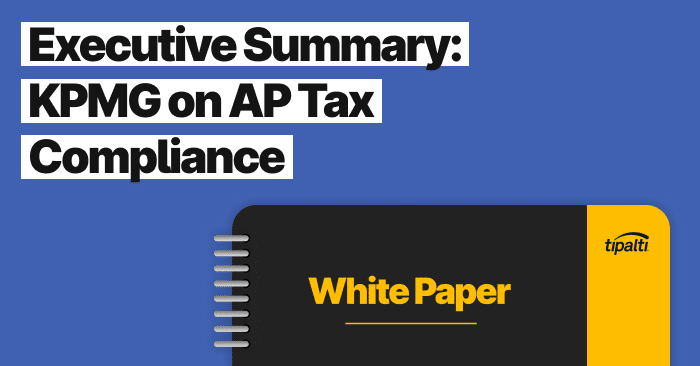
We’ve paired this article with Laurie Hatten-Boyd’s AP Tax Compliance webinar. Get your Executive Summary to find out how FATCA requirements impact organizations with a global supplier base.
Fill out the form to get your free eBook.

Laurie Hatten-Boyd, Principal at KPMG LLP, shared her insights on the impact of US tax compliance rules for companies paying their global suppliers. In this summary of her one-hour webinar, Hatten-Boyd explains how FATCA requirements impact organizations with a global supplier base and the legal and financial penalties they may face for non-compliance. Read the executive summary to get the must-have takeaways from the webinar. – An overview of US tax rules for companies paying global suppliers, including FATCA requirements – Steps your organization can take to avoid legal and financial penalties – How to ensure your payees select the correct form based on their country and corporate structure – How to determine which payees require tax withholding by treaty – The basics around end-of-year 1099/1042-S tax reporting
New reporting rules, introduced with immediate effect from January 1, 2024, requires online platforms to collect and share their sellers’ transactional data with HMRC.
This is part of a broader collaborative effort by the Organisation for Economic Cooperation and Development (OECD) to clamp down on tax evasion.
While this will significantly affect many digital platforms that must update their software tools to collect and verify this data, Tipalti’s DAC7 reporting feature provides detailed information on payee data. This will make it easier and more cost-effective for platforms to comply with the new reporting rules in a streamlined and automated way.
Who Will the New Rules Apply To?
Platform sellers are not required to pay additional tax. Still, they will need to report on their activities to HMRC if they fall into the bracket of those affected, notably if they sell 30 items or more per year or have earnings exceeding £2,000 (currently around £1,735).
Platforms are only exempt from reporting if they don’t allow sellers to make a profit or have any reportable sellers (i.e., they provide listing/advertising services but don’t have the facility to transact).
At the time of the announcement, HMRC said:
“The reason we’re asking digital platforms to share information with us is to ensure businesses operating via these platforms pay the correct amount of tax and do not have an unfair advantage over the high street and other traditional businesses.”
Data That Needs To Be Collected
While the regulations apply from January 2024, the first reports are not due until January 2025. However, businesses should be making preparations now to ensure compliance for next year.
Platforms must provide HMRC with identifying information (such as business names, addresses, and the date of birth and national insurance numbers of sole traders) on sellers, income earned, bank account numbers, and sort codes.
Once provided, this will enable HMRC to match up information.
While some online platforms collect a lot of this data already, they will still need to introduce new processes for accessing and submitting that data in a streamlined way.
These changes may result in upfront costs for platforms, including updating systems to collect more information, communicating changes to sellers, training staff to provide information in the XML schema format, and implementing new information collection and verification processes.
Platforms will need to make changes while maintaining a positive customer experience and also provide sellers with a copy of the information sent to the tax authorities.
Second-hand clothes site Vinted said: “We are currently finalising some tools, and we’ll be contacting eligible sellers through next year with information on the steps they need to take and why.”
How Tipalti Can Lessen the Admin Workload
Platform businesses can ease the cost and simplify the process of incorporating these new rules with the Tipalti Finance Automation Platform, which already incorporates DAC7 compliance.
DAC7 is an EU directive introduced in 2021 that requires platforms operating in the 27 member states to share their data with the tax authorities. It is broadly aligned with the OECD’s measures in terms of its scope and data collection.
Tipalti DAC7 tax compliance features include:
Data Collection—During onboarding, Tipalti securely guides payees to provide data such as personal/business information, tax identification numbers (TINs), and VAT IDs.
Preparation Reports—Tipalti allows platforms to download DAC7 tax preparation reports to save time on end-of-year tax reporting. Reports include each payee’s unique identification number, tax form response, financial account information, and considerations paid through Tipalti grouped by quarter.
